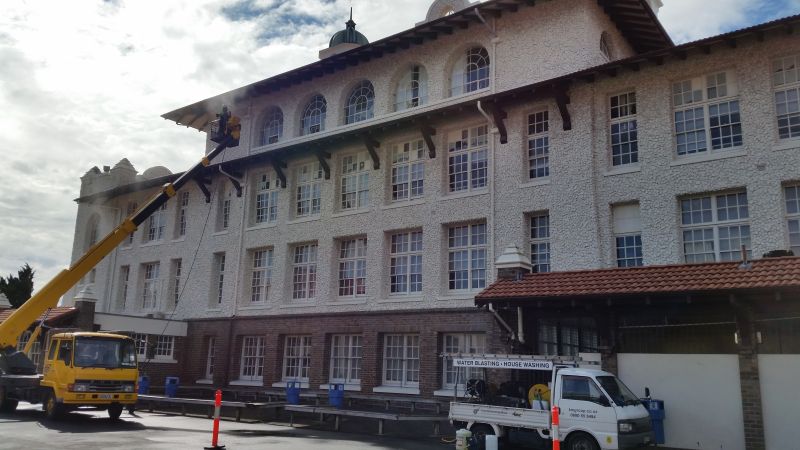
Image supplied by Kiwi Maintenance Group Ltd.
Maintaining a school’s property is about more than aesthetics; it’s essential for creating safe, functional and practical learning environments.
One of the first things students, parents and caregivers, and staff will notice about your school is its presentation. If buildings and school grounds are untidy and in poor repair, visitors to your school will be unimpressed, and morale among staff and students may be low. Perhaps more worryingly, poorly maintained school grounds can present a health and safety risk, and may become a financial liability.
Read the latest print edition of School News online HERE.
School boards and proprietors are responsible for overseeing property maintenance. Regular maintenance keeps schools safe and free from hazards and potential health and safety risks, including falling objects or obstructions.
School maintenance can be separated into three broad categories — regular, cyclical and specialist or technical maintenance.
Regular maintenance would include day-to-day tasks, such as trimming hedges, removing rubbish and cleaning footpaths and common areas. Cyclical tasks are any that occur on a cycle, for example painting the outside of buildings or cleaning external windows. Some work will need to be carried out by a qualified tradesperson, for example inspections of gas appliances, servicing security panels and associated componentry, and playgrounds maintenance. This would be regarded as specialist or technical maintenance.
The Ministry of Education provides maintenance plan templates for both routine and preventative maintenance for schools to adapt. A maintenance plan is important for both scheduling and budgeting for maintenance. A clear outline of tasks, timeframes and costs can ensure maintenance tasks can be performed at the best time, and work around other school projects like large scale building or landscaping activities.
An external maintenance contractor may be able to assist in developing a plan to suit your school. Experts in their field, a contractor could identify maintenance considerations your school has previously overlooked, or suggest time or cost saving measures.
Contracting one provider to undertake several maintenance tasks or engaging them in a contract for ongoing cyclical maintenance may also provide cost savings. Further, working with one provider will help that company get to know your school staff and grounds. They may then be able to identify preventative maintenance that could be carried out now, to avoid large scale works needing to be completed in the future.
Planning maintenance tasks is important to minimise disruption on school activities. Large works, for example trimming or removing big trees, or resurfacing a sports court, might best be carried out during school holidays. Similarly, noisy or dusty works could be scheduled out of school hours to lessen the impact on kaiako and tamariki.
From time-to-time, schools will need to undertake emergency, unplanned maintenance. Again, the MoE website provides resources to assist schools in assessing their property and grounds after a major incident, such as adverse weather or an earthquake. In some instances, compulsory safety precautions must be undertaken before the school can re-open.
Whatever the type of maintenance, schools should always adhere to health and safety guidelines relevant to that task.
Chris Tietjens, Managing Director at Kiwi Maintenance Group Ltd said routine cleaning is generally required to maintain warranties be it on paint, cladding or roofing.
“Routine cleaning keeps mould, lichen, and general soiling from building up and degrading the finish of the product which in turn compromises water tightness. Maintaining clean and clear gutters will prevent water egress to the facade from water overflow.
“The cleaning routine, depending on warranty requirements, may be six or 12 monthly and can be carried out in term breaks minimising impact on students and staff,” Mr Tiejens said.
Clean, tidy, well-maintained grounds will have a positive impact on everyone in your school community, and planning ahead will make maintenance easy to manage.
This article first appeared in the Term 4 edition of School News. Read it online HERE.
The much-delayed English draft curriculum is now out for consultation, generating discussion from teachers.
Research from AUT demonstrates arts, culture and recreation have positive impacts on all aspects of…
How effective has the school phone ban been in achieving its aims? Researchers from the…
School camps and excursions deliver hands on learning experiences, helping to consolidate classroom learning.
Innovations in AV technologies present new opportunities to engage with students. We look at how…
A new report from the University of Auckland’s Our Voices Project asks young people what…
This website uses cookies.